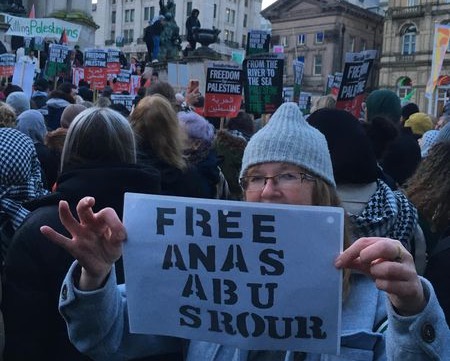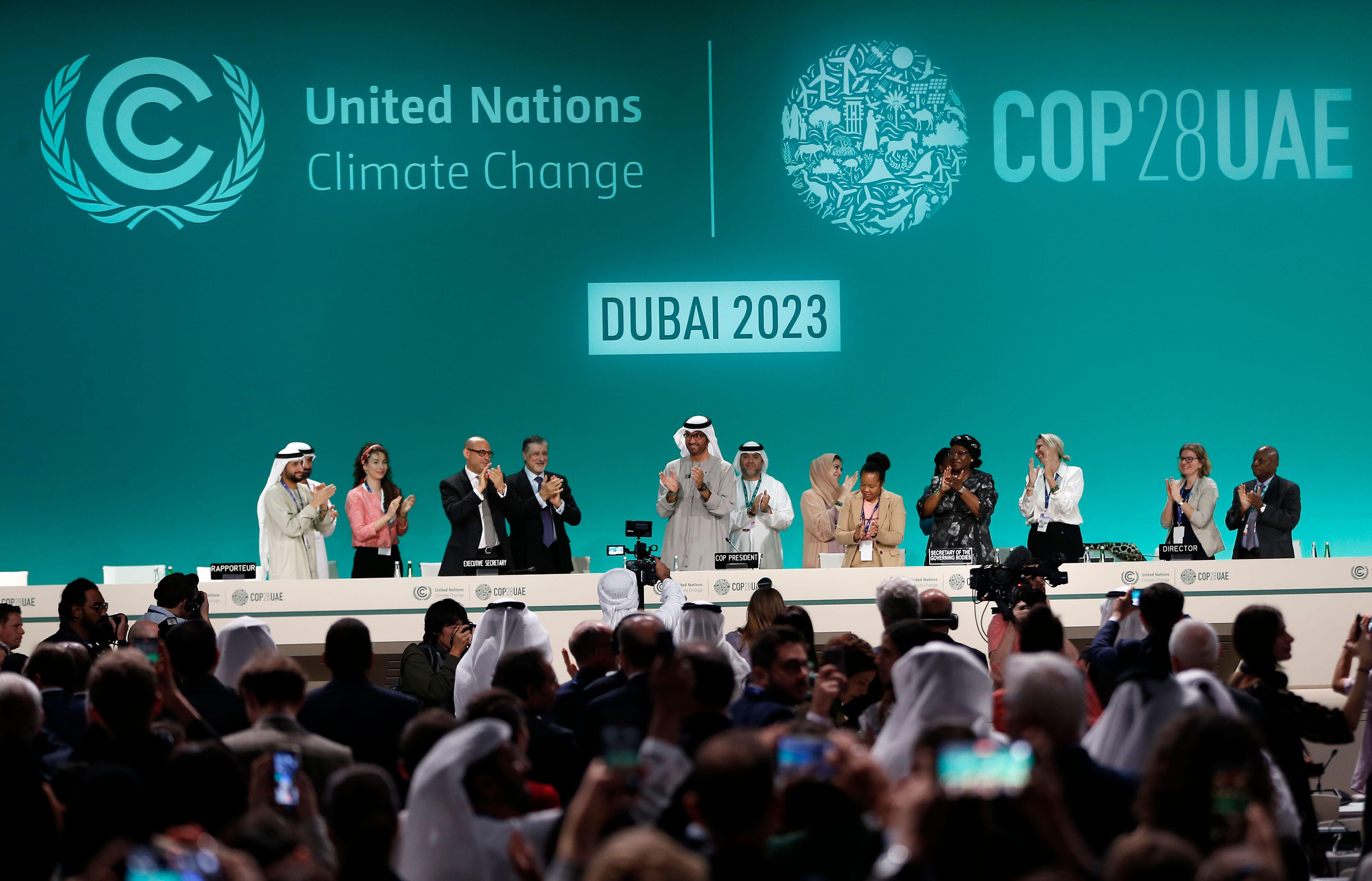The final document approved at COP28 sent a “strong signal” on the elimination of fossil fuels but failed to provide the funding this requires, Cafod has said.
After negotiations which extended beyond the conference’s scheduled close on Tuesday, delegates agreed to support a “First global stocktake” text presented to them on Wednesday morning that recognised the need to move away from fossil fuels – the first time a COP document has acknowledged this.
It calls on countries to contribute to “transitioning away from fossil fuels in energy systems, in a just, orderly and equitable manner, accelerating action in this critical decade, so as to achieve net zero by 2050 in keeping with the science”.
The COP28 president Sultan Al Jaber called it “a true victory for those who are sincere and genuine in helping address this global climate challenge”.
Cafod’s director of advocacy Neil Thorns welcomed this “explicit reference to a world without fossil fuels”, as well as the space dedicated in the report to the need to address “loss and damage” – destruction resulting from climate change, typically in poorer countries – but said it was “far from clear” how this would come about without new funding.
The COP28 document acknowledges “the significant gaps, including finance, that remain in responding to the increased scale and frequency of loss and damage, and the associated economic and non-economic losses”.
Mr Thorns told The Tablet that despite some scepticism about the Dubai conference, its “clear message on fossil fuels” made it a significant event.
“Given where we were, in a petrol state with head of the national oil company [Sultan Al Jaber] as president, COP28 ranks well,” he said. “It provided those important signals of what we need to do in this decade of delivery.”
He said he believed states “that hang on to fossil fuels will soon be left behind”.
Reference to fossil fuels in the final text was hotly debated in the final days of the conference, with faith groups urging delegates to commit to end their use as negotiations ran overnight on Monday.
Demonstrators lined the entrance to the meeting rooms in the Expo City centre in Dubai in a human chain, calling on governments to fund plans to phase out fossil fuels worldwide.
“We cannot and must not sell away our children’s future for financial gain and in the name of development,” said a joint faith community Talanoa statement to COP28 on Tuesday, delivered by the Revd Tamsyn Kereopa of the Anglican Church of Aotearoa New Zealand and Polynesia. “There is no time to lose: it is our moral obligation to act now.”
The UN Secretary General António Guterres demanded “an ambitious outcome that demonstrates decisive climate action and a credible plan to keep the 1.5°C warming limit alive and to protect those on the frontlines of the climate crisis”.
The latest draft agreement presented on Tuesday did not refer directly to a “phase out” of fossil fuels, as supporters had demanded.
Ireland’s environment minister Eamon Ryan called that draft “grossly insufficient” and “incoherent”. Samoa’s Cedric Schuster, chair of the Alliance of Small Island States, said: “We will not sign our death certificate.”
Saudi Arabia, the world's top oil exporter, opposed any bid to “phase out” or “phase down” fossil fuels, while the Organisation of Petroleum Exporting Countries urged its members to block any such language in COP28’s final document, which required the approval of all 198 countries represented.
The text presented on Wednesday morning referred instead to a “transition”. Al Jaber, sitting as president in the plenary hall, said that “hearing no objection” the conference had approved the text, confusing some delegates who had expected a debate.
The Alliance of Small Island States did not formally object to the agreement but said that it had not been given time to present a proper response. The alliance’s lead negotiator, Samoa’s Anne Rasmussen, said that it contained “a litany of loopholes”.
Supporters of the Loss and Damage Fund for victims of climate change expressed concern that it totalled only $700m or just 0.2 percent of the $400 billion needed each year to address climate-change-related disasters.
Alongside Cafod, the Catholic Relief Service and other Church agencies lobbied throughout the summit for an end to fossil fuel extraction. African bishops appealed for COP28 delegates “to recognise their moral duty and urgently commit to taking ambitious action to protect our common home and the most vulnerable”.
“We need to protect Africa and the rights of indigenous peoples, in particular, must be uplifted, as they are the best guardians of our common home,” they said ahead of the summit.
Interfaith groups endorsed the Fossil Fuel Non-Proliferation Treaty, with the Pacific nation of Nauru becming the twelfth country formally party to it.
On 5 December an online meeting, “A Global Catholic Letter to COP28 Presidency”, involved Archbishop Peter Loy Chong of Suva in Fiji, which is on the frontline of climate impacts, and Lorna Gold, chief executive of FaithInvest.
Mr Thorns told The Tablet that the Pope’s support for climate action was a significant influence at the conference, despite his absence, as his previous appeals for an end to fossil fuels “enabled the Holy See delegation to repeat those calls” in Dubai.
“Just his presence would have been wonderful, but his words were still echoing through the halls,” Mr Thorns said.
Last Saturday’s Global Day of Action saw public demonstrations in Dubai. Christian Aid reported that hundreds of protesters urged world leaders to end fossil fuels, while civil society representatives demonstrated inside the UN venue for climate justice.
A march in the Democratic Republic of Congo demanded full loss and damage finance and the promotion of renewable energy. In Uganda, activists delivered a petition to parliament calling for an end to oil use.
In India, women marched in Manipur calling for a “Just Transition for Workers and Communities”. The Philippine Movement for Climate Action marched in Manila “to contribute to the chorus of global voices putting pressure on governments and decision-makers as COP28 enters its crucial days of negotiations in Dubai”. More than 50 other cities in the Philippines cities saw climate demonstrations last Saturday.
“While the government is talking, we are hanging by a thread” said a large banner hanging from Venice’s Rialto Bridge in Italy.
The Faith Pavilion at COP28 became an important centre for dialogue, hosting five session on Sunday with 28 speakers focused on climate-resilient food systems and interfaith efforts to preserve natural resources.
The Indian environment minister Bhupender Yadav visited the pavilion during the closing days of the summit, as did Jeffrey Sachs, director of the Centre for Sustainable Development and president of the United Nations Sustainable Development Solutions Network, who applauded Pope Francis and Dr Ahmed Al-Tayeb, the Grand Imam of Al-Azhar, for collaborating to find solutions to the climate crisis.
Speaking at the Faith Pavilion, Filippo Grandi, the UN High Commissioner for Refugees, said it affirmed that religious groups play an important role in addressing climate change.



 Loading ...
Loading ...